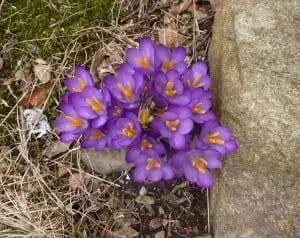Gardeners are oh-so-ready
By Pamela Doan
The weather has been so warm and mild that trees are budding and flowers blooming early. A gardener eager to get his or her hands dirty may well ask: Is it okay to start planting and, if so, what should I start with?
Although the recent temperatures have felt more like May than March, the last frost date for our region is May 15. That means spring snowstorms or freezes are not only possible, but likely, and new plants could die or be damaged. Damage could include not blooming or producing fruit, stalled growth and loss of leaves.
Some plants will tolerate frost, but not a heavy snow. The most important factor is soil temperature. The coolest temperature at which some garden crops such as lettuce, kale, spinach, peas, radishes and parsnips will germinate is 40 degrees. Other crops such as onions, Swiss chard and leeks will germinate at 50 degrees. You’ll notice these are primarily leafy greens and root vegetables.
After that, we get into the summer vegetables, which will grow at 60 and 70 degrees. Tomatoes fall into the warmest category; unless it’s a really warm May, wait and put them in the ground at the end of the month. They prefer nighttime temperatures of 65 to 70 degrees.
Now is an ideal time to plant trees and shrubs. They can get settled before the hot weather and won’t care if there’s another cold spell. Watering is the key to success. Water daily or weekly, depending on rainfall.
Soil temperatures also affect grass seed. Wait until it’s warmed up to 55 to 65 degrees before re-seeding lawns. If fertilizers are needed — which can only be determined by testing the pH balance of the soil — use Memorial Day and Labor Day as bookends.
Soil thermometers are sold at garden supply stores and landscape centers or online at many big-box retailers. They range in price from $5 to $50, depending on features. Most home gardeners just need a basic model.

Row covers will protect crops and warm the soil faster, among other things. Made from fabric that allows the sun’s rays to penetrate, the cover will trap heat around plants, block wind and warm the soil faster.
Mulch will also warm the soil and, alternatively, keep it cool in summer. Anything planted now will benefit from mulching and make the gardener’s job easier by suppressing weeds and maintaining moisture levels, which means fewer trips with the hose.
For flowers, there are some that can be planted now, but watch the weather forecast and be ready to cover them if there’s a frost warning. Hellebores are hardy and will bloom now.
It’s not too late to plant some summer blooming bulbs. Look for varieties of lily, dahlia and gladiolus, among others.
There’s one more option to consider for spring planting — cover crops. Cornell University’s guide lists medium red clover, yellow mustard and buckwheat as possibilities that can be sown in March and April to reap benefits for the summer growing season. Check the germination and growing lengths on the seed before you buy and plan according to what you intend to put into the garden. Clover is a source of food for native pollinators and can be a sustainable resource, as well.
Ready, set, plant sales
Stonecrop Garden will host its annual Alpine Plant Sale on April 23 on its grounds in Cold Spring. The garden brings together nurseries from all over the northeast. This is a good opportunity to learn about alpine plants and discover new varieties.
The Native Plant Center at Westchester Community College in Valhalla will hold its annual fundraiser sale on April 30. Visit sunywcc.edu/about/npc to preview the offerings.
The Philipstown Garden Club annual sale and fundraiser will be from 9 a.m. to 1 p.m. on May 7 at the North Highlands Fire Station. It will include many native plants beneficial for pollinators.
The Cornell Cooperative Extension Master Gardener Plant Sale is scheduled for May 14 in Brewster. The sale includes vegetables, herbs, native plants, annuals, perennials and garden supplies at very reasonable prices. All varieties are chosen for their viability in local conditions. The extension will also offer free soil pH testing.
The Hudson Highlands Nature Museum in Cornwall will hold its Native Plant Sale on May 21. The museum is taking pre-orders; visit hhnm.org.

